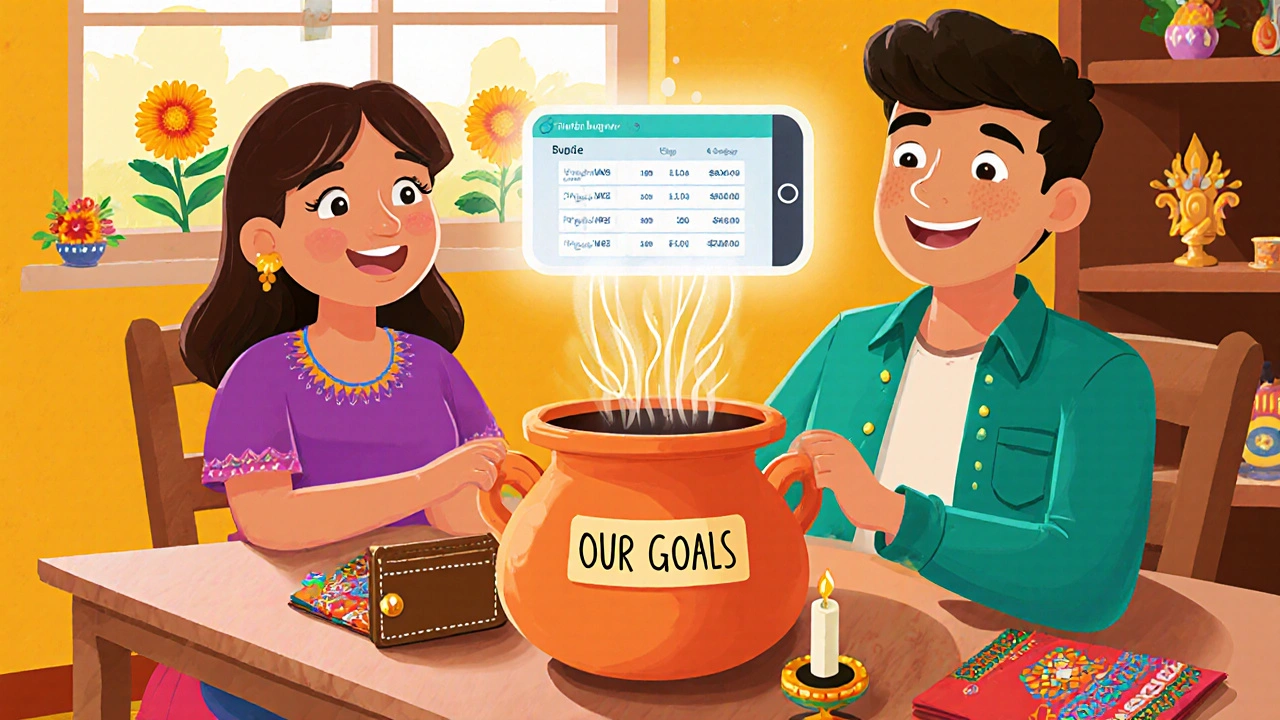Fair Budget Split Calculator
Calculate Your Fair Split
Determine how to split shared expenses based on your income ratio. This helps avoid resentment when one partner earns more.
Money fights are one of the top reasons couples break up. Not because they don’t love each other, but because they never figured out how to talk about money without blame, shame, or silence. The good news? You don’t need to be rich to fix this. You just need the right system. Shared wallets and joint budgets aren’t about merging everything into one pile. They’re about building trust, clarity, and teamwork around money - the kind that lasts.
Why Joint Budgets Work Better Than Separate Accounts
Many couples start out with separate accounts because it feels fair. You each pay your own bills, keep your own spending money, and avoid the awkwardness of asking, "Did you buy that?" But over time, that setup creates a different kind of tension. One person saves aggressively while the other spends freely. One pays for rent, the other for groceries. Eventually, someone feels like they’re carrying the load. Or worse - no one knows where the money’s going. A joint budget changes that. It doesn’t mean you lose your independence. It means you both see the full picture. When you both know how much is coming in, where it’s going, and what you’re saving for, you stop guessing. You stop resenting. You start planning. Research from Kansas State University shows couples who use shared budgeting tools have 32% fewer money arguments than those who don’t. Why? Because transparency kills assumptions. When you can see your partner’s coffee run or their new headphones in real time, you’re less likely to assume they’re being reckless. You’re more likely to ask, "Hey, what’s this for?" - and have a calm conversation instead of a silent grudge.Three Ways Couples Manage Money - And Which One Works Best
There’s no one-size-fits-all approach. But most couples fall into one of three patterns:- Full Pool (28%): All income goes into one account. All bills and spending come out of it. Simple, but can feel unfair if incomes are very different.
- Separate Accounts (15%): Each person handles their own money. No shared tracking. Often leads to confusion and hidden spending.
- Blended Approach (57%): A shared account for joint expenses (rent, groceries, utilities) + separate accounts for personal spending. This is the sweet spot for most couples.
How to Choose the Right App (And Avoid the Pitfalls)
There are dozens of apps designed for couples. But not all are built the same. Here’s what actually matters:- Real-time sync: If one person enters a transaction and the other doesn’t see it for hours, you lose trust. Apps like Honeydue and YNAB update instantly across devices.
- Customizable splits: If you earn 70% of the household income and your partner earns 30%, splitting everything 50/50 feels unfair. Lumio now offers income-based splitting - a big step forward.
- Manual vs. automatic: Goodbudget forces you to manually log every expense. It’s slower, but that slowness forces conversation. YNAB and Honeydue auto-import transactions. Faster, but you might miss the chance to talk about why you spent $80 on a meal.
- Privacy controls: Some apps let you hide certain categories (like gifts or hobbies) from your partner. That’s not deception - it’s boundaries. Healthy systems allow space for personal spending without judgment.

Setting Up Your System - Step by Step
Don’t just download an app and hope for the best. Here’s how to do it right:- Share your full financial picture. This includes debts, savings, credit cards, and side income. No secrets. This takes 3-7 days. Be honest - even if it’s uncomfortable.
- Choose your structure. Go with the blended model unless you have a strong reason not to. Set up one shared checking account and two personal accounts.
- Decide on rules. What’s the spending limit that requires a conversation? $50? $100? $200? What counts as a "shared expense"? Groceries? Pet food? Streaming services? Write it down.
- Assign allowances. Give each person 15-25% of their income as "no-questions-asked" spending money. This isn’t a reward. It’s a safety valve.
- Schedule a weekly money check-in. Fifteen minutes. No phones. Just: "What did you spend on your allowance? Any big purchases coming up? How’s the savings goal looking?"
What Happens When Things Go Wrong
Even the best systems hit snags. Here’s what to watch for:- One person forgets to log expenses. This happens in 43% of failed setups. Fix it by setting phone reminders or linking your debit card to the app so it auto-logs.
- One person feels controlled. If your partner starts commenting on every coffee purchase, you’ve crossed into micromanaging. Revisit your allowance rules. Reaffirm: "This is your money to spend how you want."
- Automation creates resentment. If an app automatically splits a $300 electric bill 50/50 but you make twice as much, it feels unfair. Turn off auto-splitting for variable bills. Manually adjust based on income ratio.
- Privacy fears. Some people hate the idea of their partner seeing every transaction. That’s okay. Use apps that let you hide categories. Or start with just shared bills - no personal spending tracking - and expand slowly.

Real Stories - What Actually Works
One Reddit user, u/BudgetingNewbie, said their couple went from 15 money fights a month to just two after using Honeydue. Why? "We stopped assuming. We started asking. And suddenly, we weren’t enemies - we were teammates." Another couple using Goodbudget said manual entry forced them to talk about every purchase. "It was awkward at first. I hated saying, ‘I spent $40 on shoes.’ But then she said, ‘I bought a new guitar.’ And we both laughed. We realized we weren’t being reckless - we were just living. And that’s okay." On the flip side, a couple using Lumio quit after three months. "It split everything 50/50, but my partner makes way more. I felt like I was paying for their luxury trips. The app didn’t let us adjust for income. It felt robotic." The lesson? Tools don’t fix relationships. They just reveal them.The Bigger Picture: Money as a Team Sport
This isn’t about balancing spreadsheets. It’s about building a life together. Shared budgets help you save for a house. Pay off student loans. Take that trip to Italy. Raise kids without constant financial stress. The goal isn’t to become identical in how you spend. It’s to become aligned in how you think. You’re not two people with separate bank accounts. You’re one team with shared dreams. And dreams need a plan. The best financial tool you have isn’t an app. It’s your willingness to show up, talk honestly, and listen - even when it’s hard. The rest? That’s just technology helping you do what humans have always needed to do: care for each other, clearly and kindly.Do we need to combine all our bank accounts to use a joint budget?
No. Most successful couples use a blended system: one shared account for joint expenses (rent, groceries, bills) and separate accounts for personal spending. You keep your own money for hobbies, gifts, or impulse buys - no questions asked. The shared account is just for what you both need.
What if one partner earns significantly more than the other?
Income imbalance is common - and it’s okay. Don’t split bills 50/50 unless you both agree. Instead, contribute proportionally. If you make 70% of the income, you pay 70% of the shared expenses. Apps like Lumio now offer income-based splitting. If your app doesn’t, just calculate it manually each month. The goal is fairness, not equality.
Is it okay to have secret spending money?
Yes - if it’s part of a clear agreement. Many couples set aside a personal allowance (15-25% of each person’s income) for "no-questions-asked" spending. This isn’t secrecy - it’s autonomy. It prevents resentment and gives space for individuality. The key is to define it upfront and stick to it.
How often should we review our budget?
Weekly 15-minute check-ins work best. Just glance at your shared app, note any big purchases, and ask: "Any big expenses coming up?" Then do a deeper review every three months - adjust goals, check savings progress, and talk about changes in income or expenses.
Can we use a joint budget if we’re not married or living together?
Absolutely. Nearly half of users of couple budgeting apps are unmarried cohabitating partners. Whether you’re dating, engaged, or just sharing a home, a joint budget helps if you’re pooling money for rent, utilities, or shared goals. The rules are the same: transparency, communication, and clear boundaries.
What if one partner refuses to join?
Start small. Use a free app like Honeydue and track only shared bills - rent, electricity, groceries. Show how easy it is. Let your partner see the benefit: fewer surprises, less stress. Don’t push. Invite. Sometimes, seeing the peace it brings is more convincing than any argument.

Laura W
November 1, 2025 AT 23:27Okay but let’s be real - the blended model is the only way to go. I tried full pool with my ex and it was chaos. She spent $200 on a yoga mat I didn’t even know we needed. Now we split rent and groceries 60/40 based on income, and each get $300/month to burn on whatever. I bought a vintage synth. She got a neon sign that says ‘Chill the F Out.’ No fights. Just vibes.
Apps? Honeydue’s free, connects to everything, and the notifications are low-key genius. No drama, just ‘Hey, rent’s due Thursday.’ Done.
Graeme C
November 2, 2025 AT 13:38Allow me to dismantle this entire premise with empirical precision. The notion that ‘transparency kills assumptions’ is a neoliberal fallacy rooted in behavioral economics’ most naive assumptions. You cannot algorithmically engineer trust - it is a relational construct, not a spreadsheet function.
Furthermore, the ‘blended model’ cited at 57% is statistically meaningless without controlling for income disparity, cultural norms, or relationship duration. The Kansas State study? N=127, self-reported, no longitudinal data. This is pop-psych fluff dressed as financial advice.
And let’s not ignore the data privacy elephant in the room: Honeydue’s TOS permits third-party analytics. You’re trading emotional intimacy for corporate surveillance. If you must use an app, use a local-first solution like Monzo’s shared pot feature - encrypted, offline-capable, and not owned by a VC-backed SaaS startup.
Also, ‘no questions asked’ spending? That’s not autonomy - it’s financial dissociation. True partnership requires accountability, not allowances.
Astha Mishra
November 4, 2025 AT 02:50Interesting perspective, though I must say, the idea of money as a team sport resonates deeply with me - especially coming from a culture where finances are rarely discussed openly, even within families. In India, we often grow up believing that talking about money is rude, impolite, even taboo - yet here we are, in the digital age, where couples are sharing budgets like they’re sharing playlists on Spotify.
But I wonder - is this shift towards transparency truly about love, or is it about efficiency? About avoiding conflict because we’ve been conditioned to fear chaos? Or perhaps, is it a quiet rebellion against centuries of patriarchal control over household finances - where women were kept in the dark, and now we demand to see every transaction?
And yes, the blended model does feel right. Not because it’s popular, but because it mirrors life itself - connection without erasure, unity without assimilation. Each person keeps their own soul, their own dreams, their own secret coffee habit - but together, we build a home. Maybe that’s the real budget: not dollars, but dignity.
I’ve started using Goodbudget with my partner. We log every rupee manually. It’s slow. Awkward sometimes. But last week, when I bought a book on Eastern philosophy and she bought a new pair of sneakers, we didn’t flinch. We just smiled. Because we knew - this is ours. Not mine. Not yours. Ours.
Kenny McMiller
November 5, 2025 AT 02:44Bro, the real flex isn’t the app - it’s the weekly check-in. Most people think they’re doing the ‘joint budget’ thing because they’ve got Honeydue synced, but they’re just automating their avoidance. You gotta sit down. No phones. No distractions. Just you, your partner, and the cold hard truth of your spending.
I used to think my GF was being shady when she’d buy those $12 smoothies every Tuesday. Turned out she was using it as a coping mechanism after her mom’s chemo. Once we talked? We set up a ‘mental health fund’ in the shared pot. Now she gets $100/month for therapy snacks. No guilt. No drama.
Also, stop using Lumio if your incomes are uneven. That app’s like a calculator that doesn’t know what ‘fair’ means. Manual splits > auto-splitting any day. And yeah, privacy controls? Essential. I hide my D&D dice purchases. My girlfriend hides her cat subscription box. We both know. We just don’t need to see the receipts every time.
Dave McPherson
November 7, 2025 AT 02:25Ugh. This is the kind of content that makes me want to delete my bank apps and move to a cabin in Montana. ‘Blended model’? ‘No-questions-asked spending’? You people treat money like a TikTok trend. This isn’t couples therapy - it’s a financial influencer’s dream.
Let me guess: you’re also using YNAB because you saw it in a podcast ad. ‘Every dollar has a job’? Bro, my dollars have jobs. They’re called ‘survival’. And they’re not signing a 99-dollar/year contract to be micro-managed by a spreadsheet.
Also, ‘real stories’? u/BudgetingNewbie? That’s a bot. I’ve seen that username in 17 different ‘money hacks’ posts. And ‘Lumio felt robotic’? Of course it did. It’s a tool, not your emotional support spreadsheet.
Here’s the real secret: if you need an app to stop fighting about money, you’re already in a failing relationship. Go get therapy. Or just stop buying each other unnecessary shit. That’s it. No apps. No check-ins. Just stop being cheap and stop being entitled. Done.